Case Study Analysis: Motivational Techniques at Jack Stores - FY021
VerifiedAdded on 2023/01/11
|7
|1222
|37
Case Study
AI Summary
This case study analyzes motivational techniques that can be implemented at Jack Stores, a discount venture of Tesco, to enhance employee performance and gain a competitive advantage. The study delves into various motivational theories, including content theories like Maslow's hierarchy of needs, which emphasizes the importance of meeting employees' physiological, safety, social, esteem, and self-actualization needs. It also explores process theories, particularly the goal-setting theory, and its components such as goal acceptance, specificity, challenging goals, and feedback. The case study discusses the benefits and limitations of each theory, providing insights into how Jack Stores can create a work culture that fosters high employee motivation, job satisfaction, and dependability. The analysis concludes by emphasizing the significance of a motivated workforce for the success of Jack Stores, highlighting the importance of addressing employee needs and providing an effective work environment.
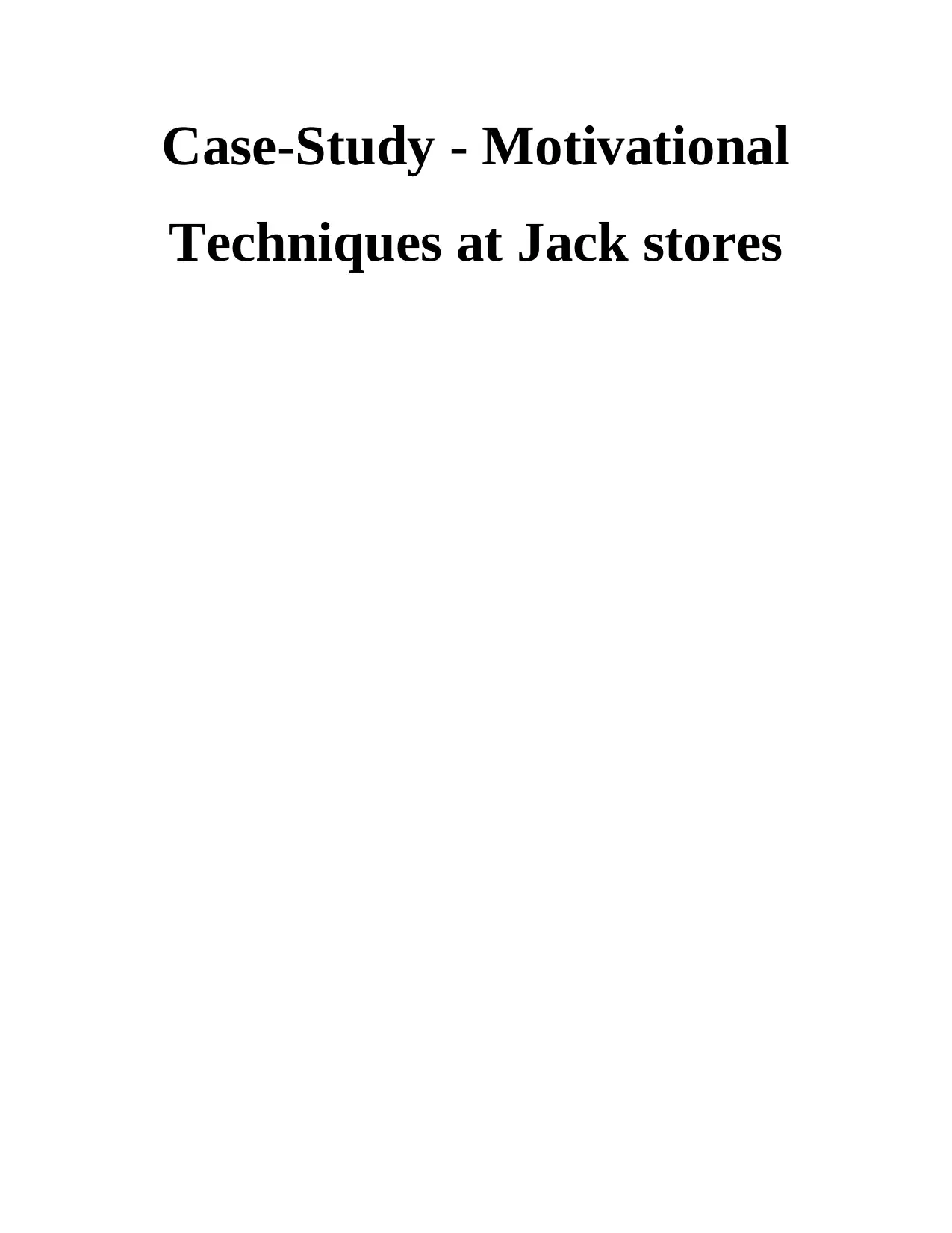
Case-Study - Motivational
Techniques at Jack stores
Techniques at Jack stores
Paraphrase This Document
Need a fresh take? Get an instant paraphrase of this document with our AI Paraphraser
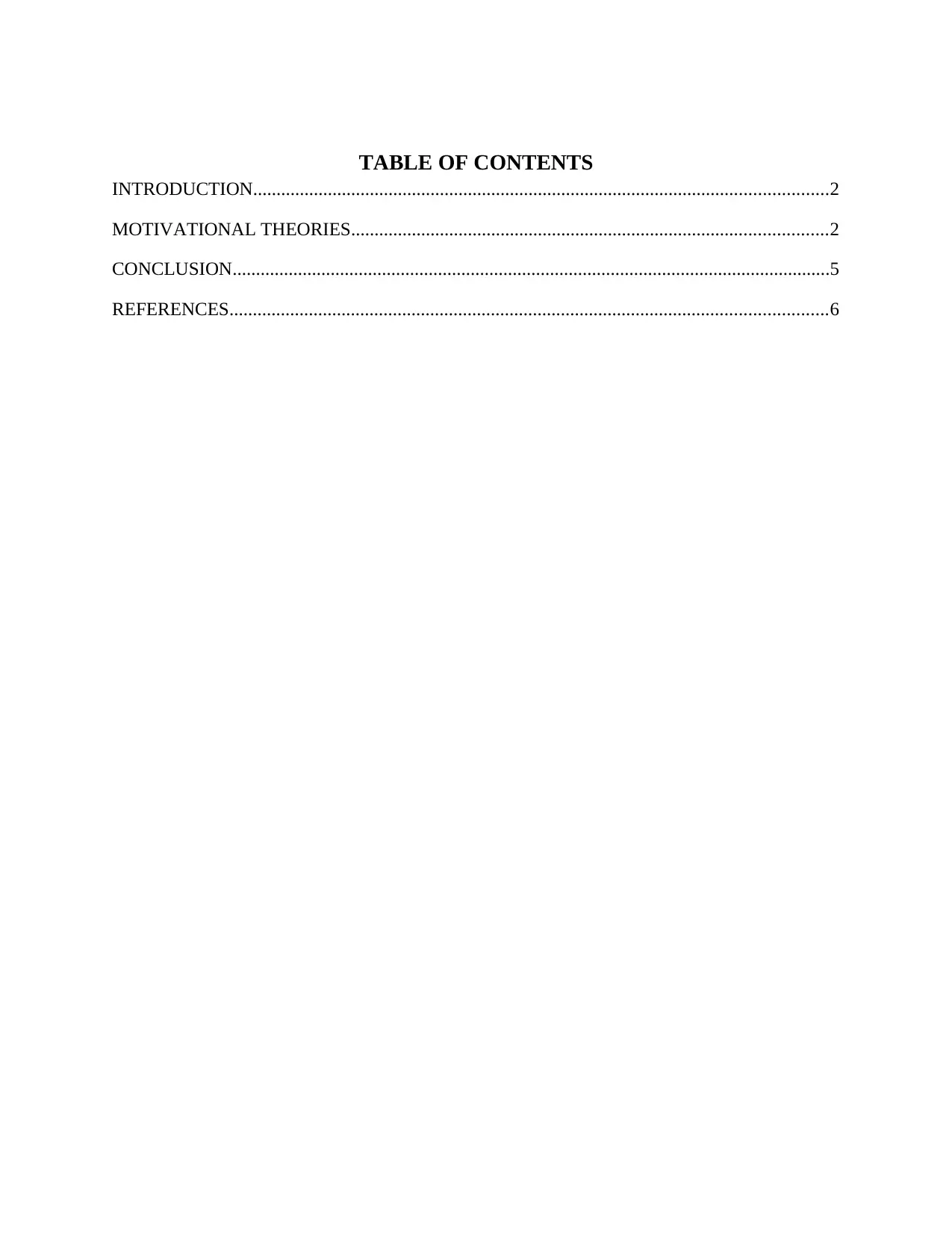
TABLE OF CONTENTS
INTRODUCTION...........................................................................................................................2
MOTIVATIONAL THEORIES......................................................................................................2
CONCLUSION................................................................................................................................5
REFERENCES................................................................................................................................6
INTRODUCTION...........................................................................................................................2
MOTIVATIONAL THEORIES......................................................................................................2
CONCLUSION................................................................................................................................5
REFERENCES................................................................................................................................6
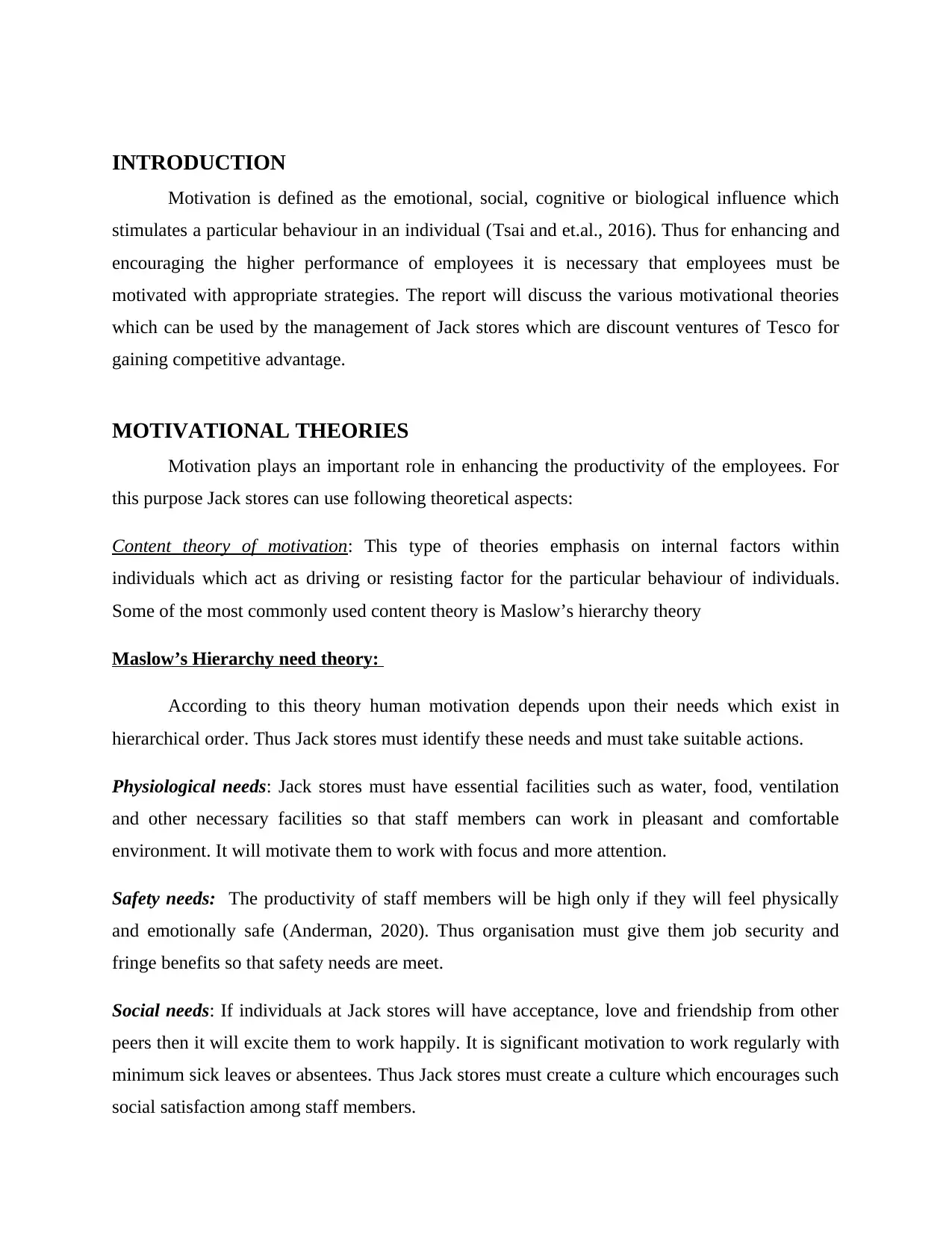
INTRODUCTION
Motivation is defined as the emotional, social, cognitive or biological influence which
stimulates a particular behaviour in an individual (Tsai and et.al., 2016). Thus for enhancing and
encouraging the higher performance of employees it is necessary that employees must be
motivated with appropriate strategies. The report will discuss the various motivational theories
which can be used by the management of Jack stores which are discount ventures of Tesco for
gaining competitive advantage.
MOTIVATIONAL THEORIES
Motivation plays an important role in enhancing the productivity of the employees. For
this purpose Jack stores can use following theoretical aspects:
Content theory of motivation: This type of theories emphasis on internal factors within
individuals which act as driving or resisting factor for the particular behaviour of individuals.
Some of the most commonly used content theory is Maslow’s hierarchy theory
Maslow’s Hierarchy need theory:
According to this theory human motivation depends upon their needs which exist in
hierarchical order. Thus Jack stores must identify these needs and must take suitable actions.
Physiological needs: Jack stores must have essential facilities such as water, food, ventilation
and other necessary facilities so that staff members can work in pleasant and comfortable
environment. It will motivate them to work with focus and more attention.
Safety needs: The productivity of staff members will be high only if they will feel physically
and emotionally safe (Anderman, 2020). Thus organisation must give them job security and
fringe benefits so that safety needs are meet.
Social needs: If individuals at Jack stores will have acceptance, love and friendship from other
peers then it will excite them to work happily. It is significant motivation to work regularly with
minimum sick leaves or absentees. Thus Jack stores must create a culture which encourages such
social satisfaction among staff members.
Motivation is defined as the emotional, social, cognitive or biological influence which
stimulates a particular behaviour in an individual (Tsai and et.al., 2016). Thus for enhancing and
encouraging the higher performance of employees it is necessary that employees must be
motivated with appropriate strategies. The report will discuss the various motivational theories
which can be used by the management of Jack stores which are discount ventures of Tesco for
gaining competitive advantage.
MOTIVATIONAL THEORIES
Motivation plays an important role in enhancing the productivity of the employees. For
this purpose Jack stores can use following theoretical aspects:
Content theory of motivation: This type of theories emphasis on internal factors within
individuals which act as driving or resisting factor for the particular behaviour of individuals.
Some of the most commonly used content theory is Maslow’s hierarchy theory
Maslow’s Hierarchy need theory:
According to this theory human motivation depends upon their needs which exist in
hierarchical order. Thus Jack stores must identify these needs and must take suitable actions.
Physiological needs: Jack stores must have essential facilities such as water, food, ventilation
and other necessary facilities so that staff members can work in pleasant and comfortable
environment. It will motivate them to work with focus and more attention.
Safety needs: The productivity of staff members will be high only if they will feel physically
and emotionally safe (Anderman, 2020). Thus organisation must give them job security and
fringe benefits so that safety needs are meet.
Social needs: If individuals at Jack stores will have acceptance, love and friendship from other
peers then it will excite them to work happily. It is significant motivation to work regularly with
minimum sick leaves or absentees. Thus Jack stores must create a culture which encourages such
social satisfaction among staff members.
⊘ This is a preview!⊘
Do you want full access?
Subscribe today to unlock all pages.

Trusted by 1+ million students worldwide
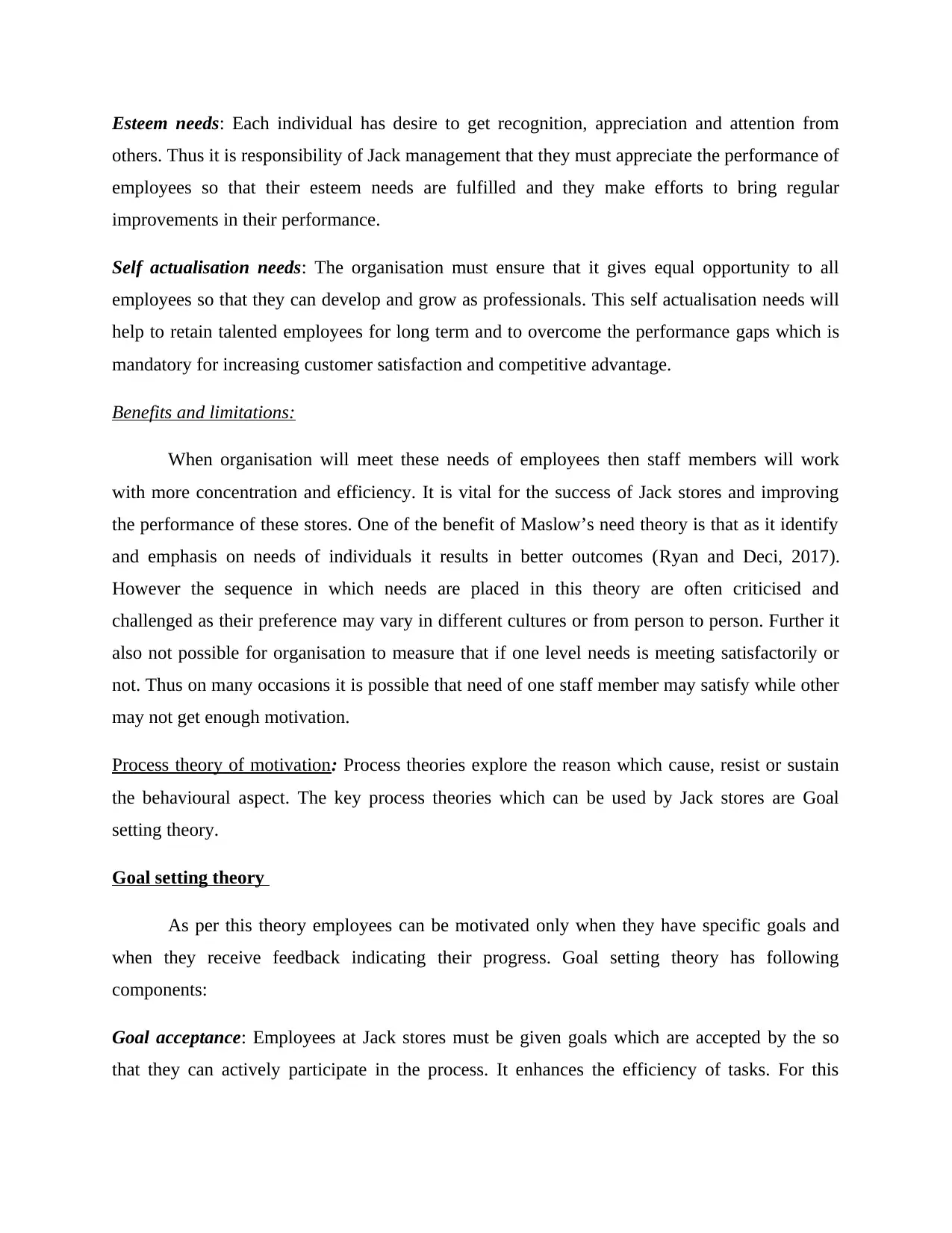
Esteem needs: Each individual has desire to get recognition, appreciation and attention from
others. Thus it is responsibility of Jack management that they must appreciate the performance of
employees so that their esteem needs are fulfilled and they make efforts to bring regular
improvements in their performance.
Self actualisation needs: The organisation must ensure that it gives equal opportunity to all
employees so that they can develop and grow as professionals. This self actualisation needs will
help to retain talented employees for long term and to overcome the performance gaps which is
mandatory for increasing customer satisfaction and competitive advantage.
Benefits and limitations:
When organisation will meet these needs of employees then staff members will work
with more concentration and efficiency. It is vital for the success of Jack stores and improving
the performance of these stores. One of the benefit of Maslow’s need theory is that as it identify
and emphasis on needs of individuals it results in better outcomes (Ryan and Deci, 2017).
However the sequence in which needs are placed in this theory are often criticised and
challenged as their preference may vary in different cultures or from person to person. Further it
also not possible for organisation to measure that if one level needs is meeting satisfactorily or
not. Thus on many occasions it is possible that need of one staff member may satisfy while other
may not get enough motivation.
Process theory of motivation: Process theories explore the reason which cause, resist or sustain
the behavioural aspect. The key process theories which can be used by Jack stores are Goal
setting theory.
Goal setting theory
As per this theory employees can be motivated only when they have specific goals and
when they receive feedback indicating their progress. Goal setting theory has following
components:
Goal acceptance: Employees at Jack stores must be given goals which are accepted by the so
that they can actively participate in the process. It enhances the efficiency of tasks. For this
others. Thus it is responsibility of Jack management that they must appreciate the performance of
employees so that their esteem needs are fulfilled and they make efforts to bring regular
improvements in their performance.
Self actualisation needs: The organisation must ensure that it gives equal opportunity to all
employees so that they can develop and grow as professionals. This self actualisation needs will
help to retain talented employees for long term and to overcome the performance gaps which is
mandatory for increasing customer satisfaction and competitive advantage.
Benefits and limitations:
When organisation will meet these needs of employees then staff members will work
with more concentration and efficiency. It is vital for the success of Jack stores and improving
the performance of these stores. One of the benefit of Maslow’s need theory is that as it identify
and emphasis on needs of individuals it results in better outcomes (Ryan and Deci, 2017).
However the sequence in which needs are placed in this theory are often criticised and
challenged as their preference may vary in different cultures or from person to person. Further it
also not possible for organisation to measure that if one level needs is meeting satisfactorily or
not. Thus on many occasions it is possible that need of one staff member may satisfy while other
may not get enough motivation.
Process theory of motivation: Process theories explore the reason which cause, resist or sustain
the behavioural aspect. The key process theories which can be used by Jack stores are Goal
setting theory.
Goal setting theory
As per this theory employees can be motivated only when they have specific goals and
when they receive feedback indicating their progress. Goal setting theory has following
components:
Goal acceptance: Employees at Jack stores must be given goals which are accepted by the so
that they can actively participate in the process. It enhances the efficiency of tasks. For this
Paraphrase This Document
Need a fresh take? Get an instant paraphrase of this document with our AI Paraphraser
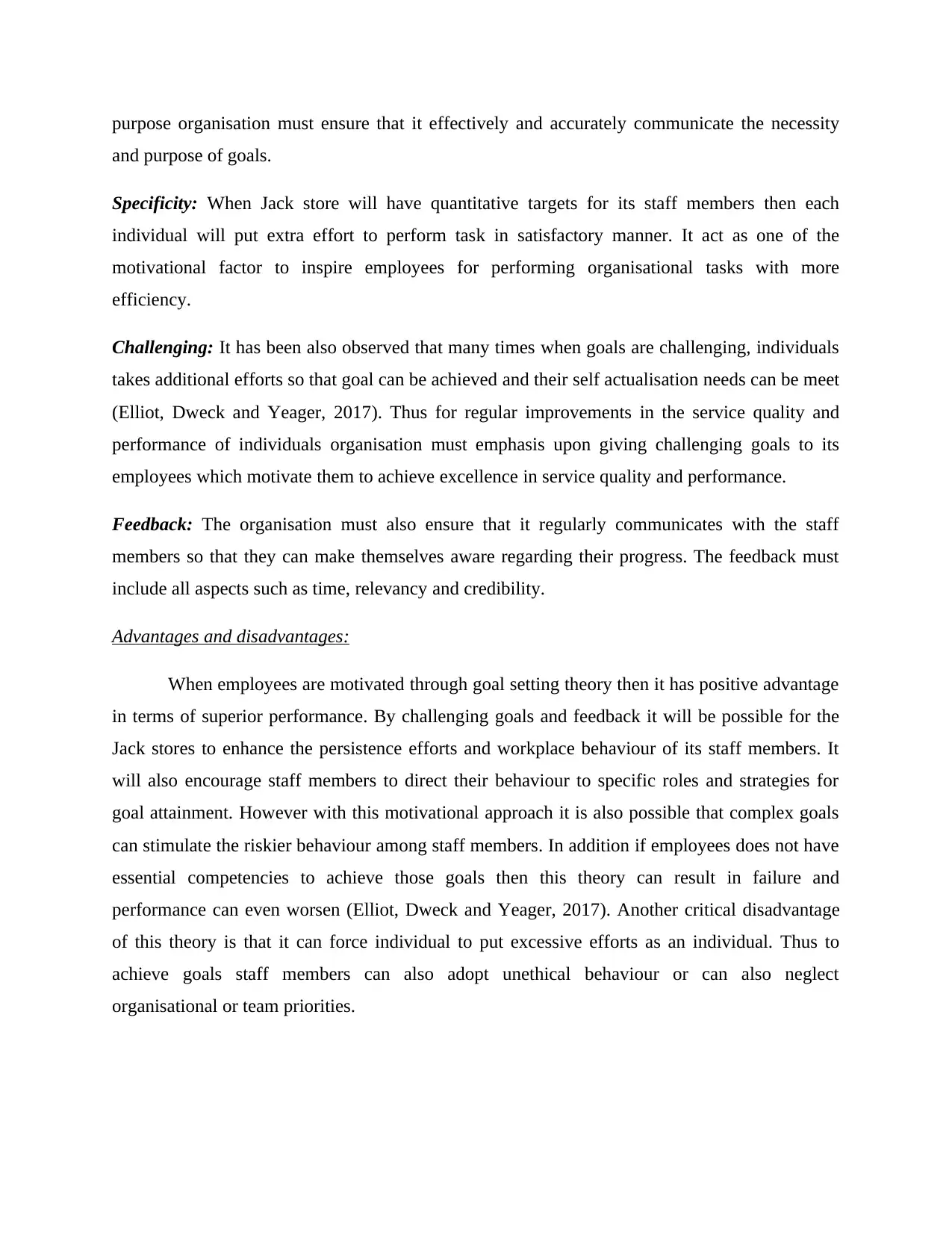
purpose organisation must ensure that it effectively and accurately communicate the necessity
and purpose of goals.
Specificity: When Jack store will have quantitative targets for its staff members then each
individual will put extra effort to perform task in satisfactory manner. It act as one of the
motivational factor to inspire employees for performing organisational tasks with more
efficiency.
Challenging: It has been also observed that many times when goals are challenging, individuals
takes additional efforts so that goal can be achieved and their self actualisation needs can be meet
(Elliot, Dweck and Yeager, 2017). Thus for regular improvements in the service quality and
performance of individuals organisation must emphasis upon giving challenging goals to its
employees which motivate them to achieve excellence in service quality and performance.
Feedback: The organisation must also ensure that it regularly communicates with the staff
members so that they can make themselves aware regarding their progress. The feedback must
include all aspects such as time, relevancy and credibility.
Advantages and disadvantages:
When employees are motivated through goal setting theory then it has positive advantage
in terms of superior performance. By challenging goals and feedback it will be possible for the
Jack stores to enhance the persistence efforts and workplace behaviour of its staff members. It
will also encourage staff members to direct their behaviour to specific roles and strategies for
goal attainment. However with this motivational approach it is also possible that complex goals
can stimulate the riskier behaviour among staff members. In addition if employees does not have
essential competencies to achieve those goals then this theory can result in failure and
performance can even worsen (Elliot, Dweck and Yeager, 2017). Another critical disadvantage
of this theory is that it can force individual to put excessive efforts as an individual. Thus to
achieve goals staff members can also adopt unethical behaviour or can also neglect
organisational or team priorities.
and purpose of goals.
Specificity: When Jack store will have quantitative targets for its staff members then each
individual will put extra effort to perform task in satisfactory manner. It act as one of the
motivational factor to inspire employees for performing organisational tasks with more
efficiency.
Challenging: It has been also observed that many times when goals are challenging, individuals
takes additional efforts so that goal can be achieved and their self actualisation needs can be meet
(Elliot, Dweck and Yeager, 2017). Thus for regular improvements in the service quality and
performance of individuals organisation must emphasis upon giving challenging goals to its
employees which motivate them to achieve excellence in service quality and performance.
Feedback: The organisation must also ensure that it regularly communicates with the staff
members so that they can make themselves aware regarding their progress. The feedback must
include all aspects such as time, relevancy and credibility.
Advantages and disadvantages:
When employees are motivated through goal setting theory then it has positive advantage
in terms of superior performance. By challenging goals and feedback it will be possible for the
Jack stores to enhance the persistence efforts and workplace behaviour of its staff members. It
will also encourage staff members to direct their behaviour to specific roles and strategies for
goal attainment. However with this motivational approach it is also possible that complex goals
can stimulate the riskier behaviour among staff members. In addition if employees does not have
essential competencies to achieve those goals then this theory can result in failure and
performance can even worsen (Elliot, Dweck and Yeager, 2017). Another critical disadvantage
of this theory is that it can force individual to put excessive efforts as an individual. Thus to
achieve goals staff members can also adopt unethical behaviour or can also neglect
organisational or team priorities.
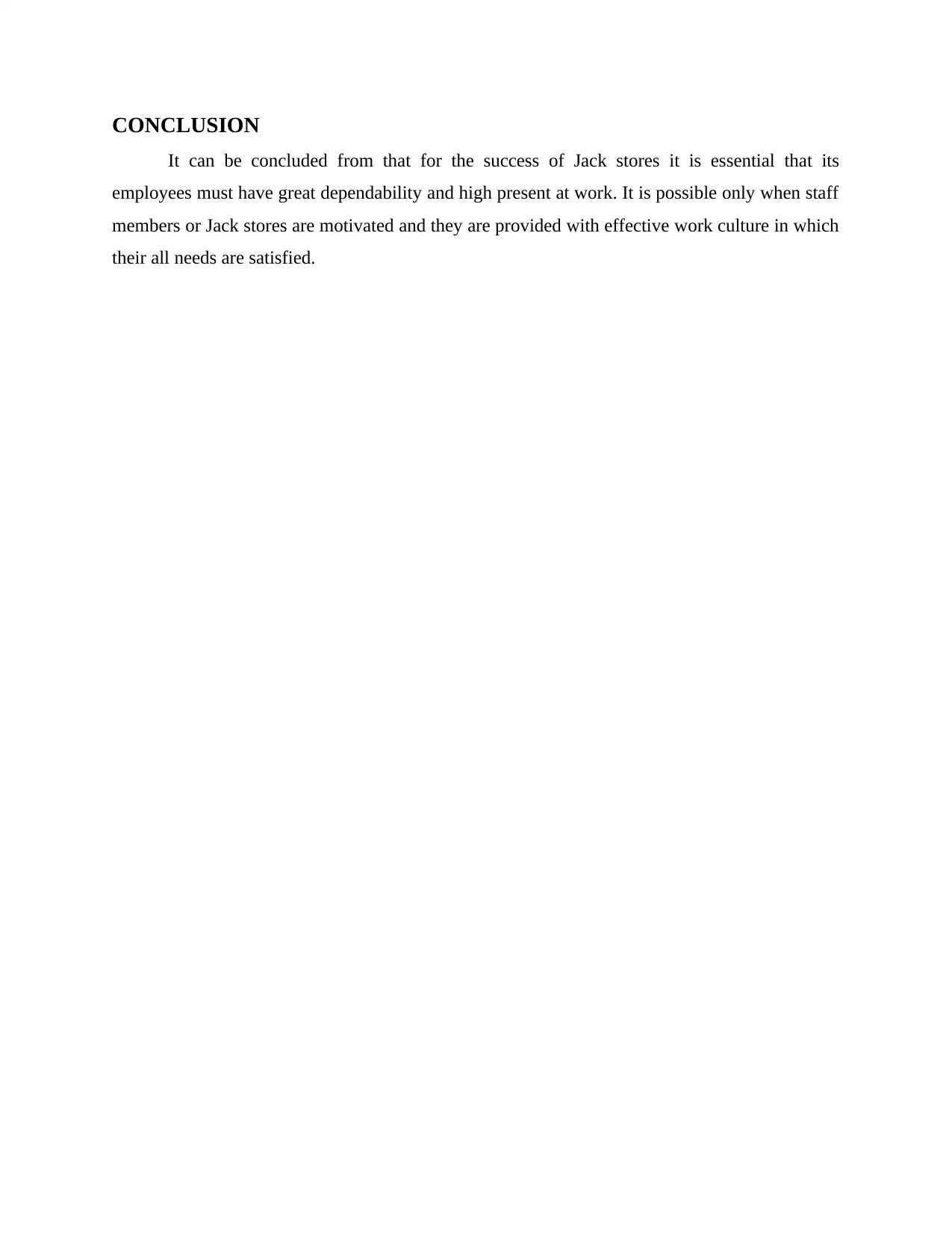
CONCLUSION
It can be concluded from that for the success of Jack stores it is essential that its
employees must have great dependability and high present at work. It is possible only when staff
members or Jack stores are motivated and they are provided with effective work culture in which
their all needs are satisfied.
It can be concluded from that for the success of Jack stores it is essential that its
employees must have great dependability and high present at work. It is possible only when staff
members or Jack stores are motivated and they are provided with effective work culture in which
their all needs are satisfied.
⊘ This is a preview!⊘
Do you want full access?
Subscribe today to unlock all pages.

Trusted by 1+ million students worldwide
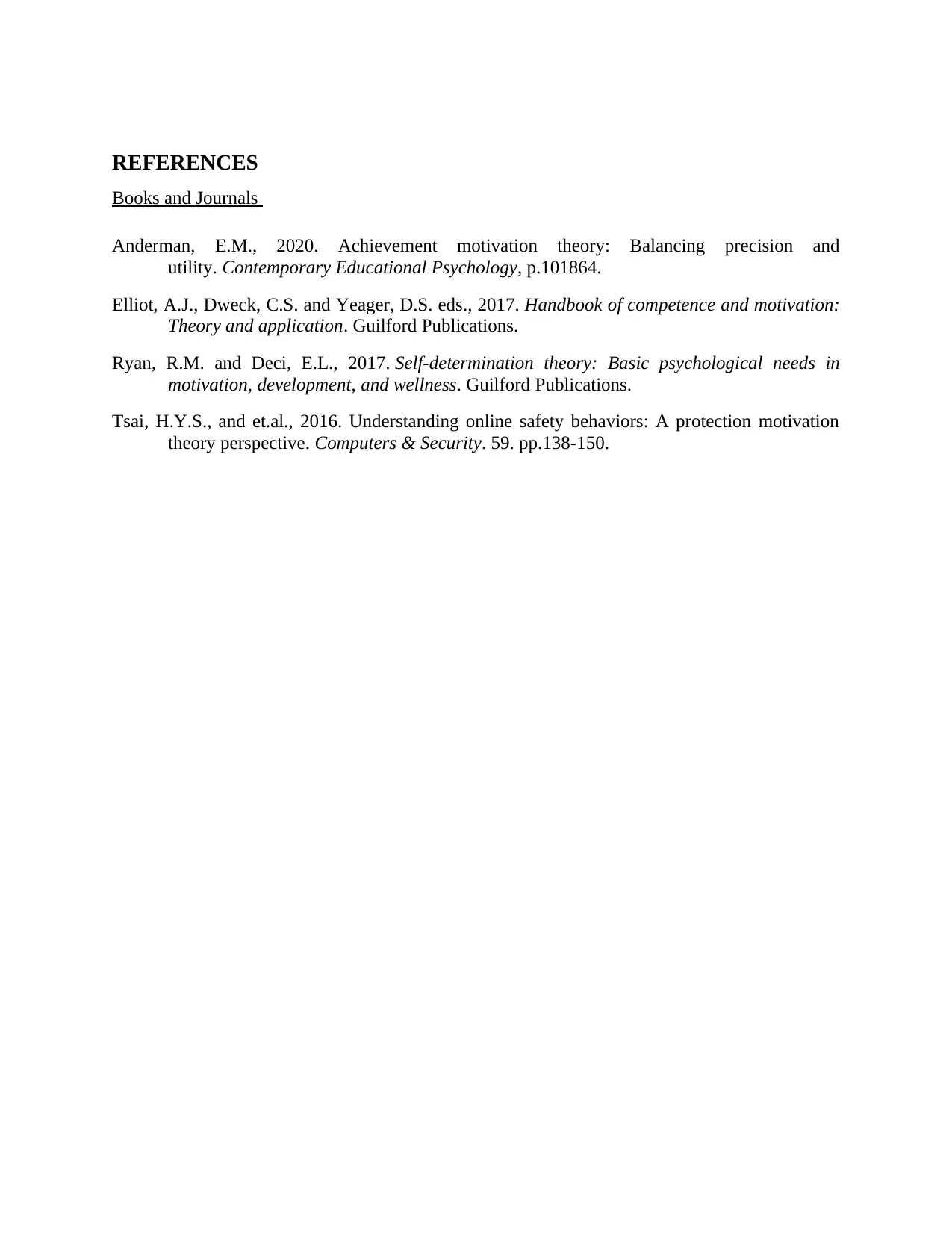
REFERENCES
Books and Journals
Anderman, E.M., 2020. Achievement motivation theory: Balancing precision and
utility. Contemporary Educational Psychology, p.101864.
Elliot, A.J., Dweck, C.S. and Yeager, D.S. eds., 2017. Handbook of competence and motivation:
Theory and application. Guilford Publications.
Ryan, R.M. and Deci, E.L., 2017. Self-determination theory: Basic psychological needs in
motivation, development, and wellness. Guilford Publications.
Tsai, H.Y.S., and et.al., 2016. Understanding online safety behaviors: A protection motivation
theory perspective. Computers & Security. 59. pp.138-150.
Books and Journals
Anderman, E.M., 2020. Achievement motivation theory: Balancing precision and
utility. Contemporary Educational Psychology, p.101864.
Elliot, A.J., Dweck, C.S. and Yeager, D.S. eds., 2017. Handbook of competence and motivation:
Theory and application. Guilford Publications.
Ryan, R.M. and Deci, E.L., 2017. Self-determination theory: Basic psychological needs in
motivation, development, and wellness. Guilford Publications.
Tsai, H.Y.S., and et.al., 2016. Understanding online safety behaviors: A protection motivation
theory perspective. Computers & Security. 59. pp.138-150.
1 out of 7
Related Documents
Your All-in-One AI-Powered Toolkit for Academic Success.
+13062052269
info@desklib.com
Available 24*7 on WhatsApp / Email
![[object Object]](/_next/static/media/star-bottom.7253800d.svg)
Unlock your academic potential
Copyright © 2020–2026 A2Z Services. All Rights Reserved. Developed and managed by ZUCOL.





